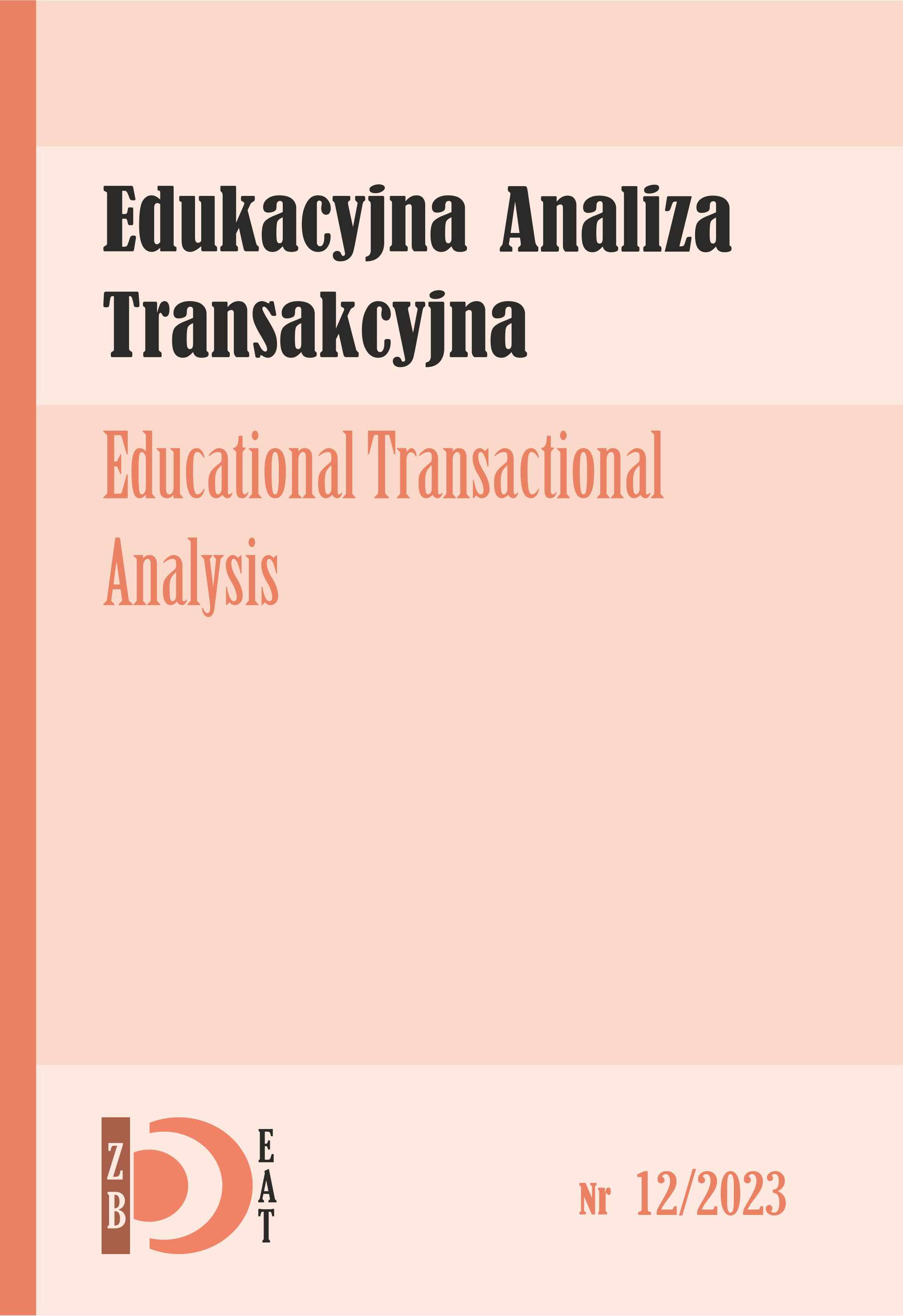Technika pustego krzesła i jego użycie w psychoterapii
DOI:
https://doi.org/10.16926/eat.2023.12.01Słowa kluczowe:
analiza transakcyjna, psychoterapia, stany ja, gestaltAbstrakt
Technika pustego krzesła jest podstawą psychoterapii od dziesięcioleci, a jej początki sięgają Fritza Perlsa i są dalej rozwijane przez Edgara Stuntza. Niniejszy artykuł analizuje wieloaspektowe wykorzystanie pustego krzesła, szczególnie w ramach analizy transakcyjnej (TA). Bada różne sposoby, w jakie terapeuci wykorzystują puste krzesło, aby ułatwić analizę strukturalną, ponowną decyzję i dynamikę rodzicielstwa, a także inne cele terapeutyczne. Czerpiąc ze spostrzeżeń z TA, terapii gestalt i terapii poznawczo-behawioralnej, autor zagłębia się w procesy psychologiczne związane z pracą na krześle, podkreślając znaczenie regresji i integracji stanu ego. Ponadto omówiono terapeutyczne implikacje pracy w fotelu, w tym jej wpływ na samozrozumienie, diagnozę i relację terapeutyczną. W artykule wskazano również, w jaki sposób praca na krześle może być dostosowana do potrzeb klientów z zespołem stresu pourazowego, podkreślając jej potencjał jako formy terapii ekspozycyjnej. Artykuł zawiera kompleksowy przegląd techniki pustego krzesła i jej różnorodnych zastosowań we współczesnej praktyce psychoterapeutycznej.
Downloads
Bibliografia
Burns, D.D. (2006). When panic attacks: The new drug-free anxiety therapy that can change your life. New York: Morgan Road Books.
Erskine, R.G. (1997). Theories and methods of an integrative transactional analysis. San Francisco: TA Press.
Goldfried, M.R. (2006). Cognitive-affective-relational-behavior therapy. In: G. Stricker, J. Gold (eds.), A casebook of psychotherapy integration (pp. 153–164). American Psychological Association.
Goulding, R. (1985). History of redecision therapy. In: L.B. Kadis (ed.), Re-decision therapy: Expanded perspectives (pp. 9–11). California: Western Institute for Group and Family Therapy.
Goulding, R.L., Goulding, M.M. (1978). The power is in the patient: A TA/Gestalt approach to psychotherapy. San Francisco: TA Press.
James, M., Jongeward, D. (1971). Born to win. New York: Addison-Wesley Publishing.
Kellogg, S., Garcia Torres, A. (2021). Toward a chair work psychotherapy: Using the four dialogues for healing and transformation. American Psy-chologist, 6(3), 171–180; https://doi.org/10.1037/pri0000149.
Mahmood, F., Flax, E. (2023). Gestalt therapy. In: T. Hanley, L. Winter (eds.), The Sage handbook of counselling & psychotherapy: Fifth edition (pp. 403–409). Sage Publications.
McNeel, J.R. (1975). Redecisions in psychotherapy: A study of the effects of an intensive weekend group workshop (PhD thesis). The California School of Professional Psychology.
McNeel, J.R. (1976). The parent interview. Transactional Analysis Journal, 6(1), 61–68.
Perls, F.S. (1969). Gestalt therapy verbatim. Lafayette: Real People Press.
Perls, F.S. (1975). Theory and technique of personality integration. In: J.O. Stevens (ed.), Gestalt is (pp. 44–69). Utah: Bantam Books.
Rogers, C.R. (1961). On becoming a person. Massachusetts: The Riverside Press.
Stark, M. (1999). Modes of therapeutic action. London: Jason Aronson Inc.
Stuntz, E.C. (1973). Multiple chairs technique. Transactional Analysis Jour-nal, 3(2), 29–32.
Tilney, T. (1998). Dictionary of transactional analysis. London: Whurr Pub-lishers.
Watson, J.C., Goldman, R.N., Greenberg, L.S. (2007). Case studies in emo-tion-focused treatment in depression: A comparison of good and poor outcome. Washington: American Psychological Association.
White, T. (2011). Working with suicidal individuals. London: Jessica Kings-ley Publishers.
White, T. (2016). Evolving theory and practice with the self-destructive individual. In: R.G. Erskine (ed.), Transactional analysis in contemporary psychotherapy (pp. 161–183). London: Karnac Books Ltd.
White, T. (2021). Redecision therapy today: A redecision relational ap-proach to transactional analysis. Kyiv: TA Books.
White, T. (2023). Trauma, memory, and the impact of redecision therapy. International Journal of Transactional Analysis Research and Practice, 14(1), 24–31.
Widdowson, M. (2010). Transactional analysis: 100 key points & tech-niques. New York: Routledge.
Young, J.E., Klosko, J.S., Weishaar, M.E. (2003). Schema therapy: A practi-tioner’s guide. New York: Guilford Press.
Pobrania
Opublikowane
Jak cytować
Numer
Dział
Licencja
Prawa autorskie (c) 2023 Tony White

Utwór dostępny jest na licencji Creative Commons Uznanie autorstwa 4.0 Międzynarodowe.
Mam świadomość, że czasopismo jest wydawane na licencji Creative Commons - Uznanie autorstwa (https://creativecommons.org/licenses/by/4.0/legalcode).
Przesyłając artykuł wyrażam zgodę na jego udostępnienie na tej licencji

